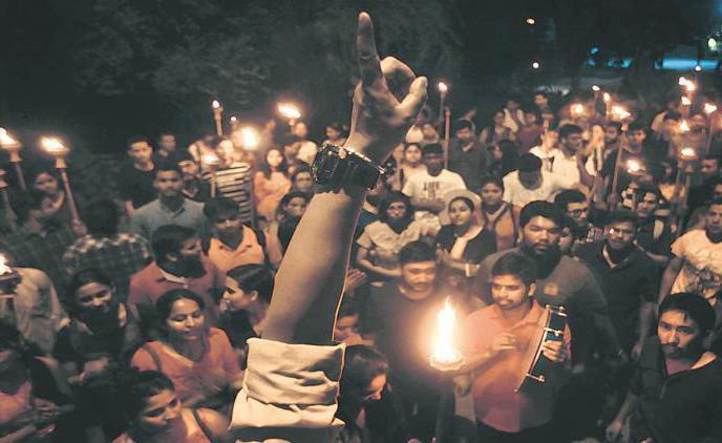The result for JNUSU elections was declared a few days ago, and Left unity swept once again. The Left unity, which comprises of AISA, SFI, AISF, and DSF, won all four posts- President, Vice President, General Secretary, and joint secretary.
Left had been a dominant force in JNU Students Union since time immemorial. In the last two decades, the right-wing ABVP has managed to win only two times for one post. Sandeep Mahapatra is the only person who won President Post for right-wing ABVP in the last five decades of JNU students’ election history. ABVP’s Saurabh Kumar Sharma is another person who won joint secretary position when he defeated the All India Students’ Association (AISA) candidate Hamid Raza by 27 votes.
In the last few years, the number of votes ABVP has bagged increased exponentially. It is the single largest party but the party has not managed to convert the votes into seats because the students’ union of Left parties formed a coalition.
The important question we should ask is- why ABVP or NSUI had not been able to break Left stranglehold in JNU even in their best years? Well, I will try to answer this by my personal experience in one of the most sought after universities in the country.
The ideas of Marx- “From each according to his ability, to each according to his needs”, has been rejected by countries around the world. There is not a single country in the world, which has state ownership on all means of production.
But the walls of JNU are still painted in Red, and every evening, the campus echoes with- ‘Red Salute, Red Salute, Red Salute to Comrade’ slogan.
The utopian idea of borderless, casteless, classless, gender-neutral still founds space on the posters pasted on the trees, bus stands, notice boards, and walls of JNU.
The university is a ‘promised land’ to adherents of Communism. The extreme freedom of expression, ideas, clothing, for which space around the world is shrinking can find space in the Promised Land.
The slogans like- Lal Salaam, We Shall Fight, We Shall Win, Brahmanvad Ho Barbaad, Bharat tere tukde hoge inshallah inshallah, Kashmir ki Azaadi se Bharat ki Barbaadi tak Jang Rahegi Jang Rahegi could be heard only inside the boundary walls of JNU.
Such extreme freedom for the ‘fringe voices’, have space only inside the boundary walls of JNU.
Some students had spent more than a decade at the university. Many students do double Masters, taken seven or eight years to complete Ph. D, only to spend maximum time in JNU. This is economical too, given the dirt-cheap price of canteen food, and negligible Hostel Fee, one can easily spend a month in JNU with 5,000 rupees in his/her pocket. Therefore, even if one works only on weekends, the person does not need pocket money from guardian to live a good life in the posh location of South Delhi.
These students vote for Left parties because only Left parties could voice support for such an ‘inefficient investment’ on the taxpayer’s money.
Left parties won most of its votes from PhD students, that too from the Social Sciences department. The Science department and undergraduate students are more likely to vote for ABVP rather than Left unity or Birsa Ambedkar Phule Students’ Association (BAPSA).
As long as JNU is a university primarily for Humanities and Social Sciences students, the stronglehold of Left will not end. Because JNU is like a utopian city, world, place- Left promises to deliver its adherents.
The utopia ends in boundary walls of JNU, as on the left side of the university is Nelson Mandela Road, which is the address for some of the most expensive and luxurious malls in the country. On the east, there is Munirka, a place infamous for filth and substandard life quality.
